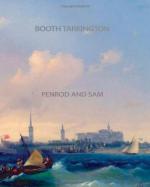The voice of Mrs. Lora Rewbush was again heard from the wings; it sounded bloodthirsty. Penrod released his victim; and the Child King Arthur, somewhat disconcerted, extended his sceptre and, with the assistance of the enraged prompter, said:
“Sweet child-friends
of the Tabul Round,
In brotherly love and
kindness abound,
Sir Lancelot, you have
spoken well,
Sir Galahad, too, as
clear as bell.
So now pray doff your
mantles gay.
You shall be knighted
this very day.”
And Penrod doffed his mantle.
Simultaneously, a thick and vasty gasp came from the audience, as from five hundred bathers in a wholly unexpected surf. This gasp was punctuated irregularly, over the auditorium, by imperfectly subdued screams both of dismay and incredulous joy, and by two dismal shrieks. Altogether it was an extraordinary sound, a sound never to be forgotten by any one who heard it. It was almost as unforgettable as the sight which caused it; the word “sight” being here used in its vernacular sense, for Penrod, standing unmantled and revealed in all the medieval and artistic glory of the janitor’s blue overalls, falls within its meaning.
The janitor was a heavy man, and his overalls, upon Penrod, were merely oceanic. The boy was at once swaddled and lost within their blue gulfs and vast saggings; and the left leg, too hastily rolled up, had descended with a distinctively elephantine effect, as Margaret had observed. Certainly, the Child Sir Lancelot was at least a sight.
It is probable that a great many in that hall must have had, even then, a consciousness that they were looking on at History in the Making. A supreme act is recognizable at sight: it bears the birthmark of immortality. But Penrod, that marvellous boy, had begun to declaim, even with the gesture of flinging off his mantle for the accolade:
“I first, the
Child Sir Lancelot du Lake,
Will volunteer to knighthood
take,
And kneeling here before
your throne
I vow to——”
He finished his speech unheard. The audience had recovered breath, but had lost self-control, and there ensued something later described by a participant as a sort of cultured riot.
The actors in the “pageant” were not so dumfounded by Penrod’s costume as might have been expected. A few precocious geniuses perceived that the overalls were the Child Lancelot’s own comment on maternal intentions; and these were profoundly impressed: they regarded him with the grisly admiration of young and ambitious criminals for a jail-mate about to be distinguished by hanging. But most of the children simply took it to be the case (a little strange, but not startling) that Penrod’s mother had dressed him like that—which is pathetic. They tried to go on with the “pageant.”




